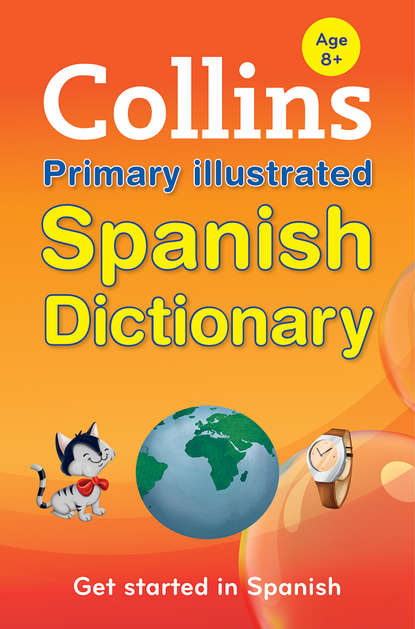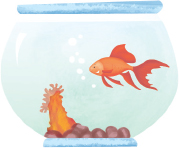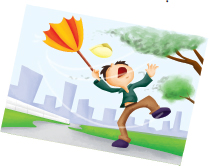
Полная версия:
Collins Primary Dictionaries
to get bored Me aburro viendo la tele. I get bored watching television.
acabar VERB
to finish Ayer acabé de pintar la valla. Yesterday I finished painting the fence. Acabo de ver a tu padre. I’ve just seen your father.
■ acabarse to run out La impresora te avisa cuando se acaba el papel. The printer tells you when the paper runs out.
acaso ADVERB
por si acaso just in case
el accidente NOUN
accident los accidentes de carretera road accidents Han tenido un accidente. They’ve had a car accident.
la acción (PL las acciones) NOUN
action una película llena de acción an action-packed film
el aceite NOUN
oil el aceite de oliva olive oil
la aceituna NOUN
olive aceitunas rellenas stuffed olives
el acento NOUN
accent ‘Té’ lleva acento cuando significa ‘tea’. ‘Té’ has an accent when it means ‘tea’. Tiene un acento cerrado del sur. He has a strong southern accent.
aceptar VERB
to accept Acepté su invitación. I accepted his invitation. Acepté ayudarles. I agreed to help them.
la acera NOUN
pavement
acerca ADVERB
acerca de about un documental acerca de la fauna africana a documentary about African wildlife
acercar VERB
1 to pass ¿Me acercas la sal? Could you pass me the salt?
2 to bring over Acerca la silla. Bring your chair over here. ¿Acerco más la cama a la ventana? Shall I put the bed nearer the window? Nos acercaron al aeropuerto. They gave us a lift to the airport.
■ acercarse
1 to come closer Acércate, que te vea. Come closer so that I can see you.
2 to go over Me acerqué a la ventana. I went over to the window. Acércate a la tienda y trae una botella de agua. Go over to the shop and get a bottle of water.
acertar VERB
1 to get … right

He acertado todas las respuestas. I got all the answers right. No acerté. I got it wrong.
2 to guess Si aciertas cuántos caramelos hay, te los regalo todos. If you guess how many sweets there are, I’ll give you all of them.
el acierto
acierto can be a noun or a verb.
A NOUN
right answer Tuve más aciertos que fallos en el examen. I got more right answers than wrong ones in the exam.
B VERB ▷see acertar No acierto a entenderlo. I can’t understand it at all.
aclarar VERB
to clear up Necesito que me aclares unas dudas. I need you to clear up some doubts for me. Con tantos números no me aclaro. There are so many numbers that I can’t make head nor tail of it.
acompañar VERB
acompañar a alguien to come with somebody/to go with somebody
Language tip
acompañar a alguien has two meanings. Look at the examples.
Si quieres te acompaño. I’ll come with you if you like. Me pidió que la acompañara a la estación. She asked me to go to the station with her.
aconsejar VERB
to advise Te aconsejo que lo hagas. I’d advise you to do it.
acordarse VERB
to remember Ahora mismo no me acuerdo. Right now I can’t remember. acordarse de to remember ¿Te acuerdas de mí? Do you remember me? Acuérdate de cerrar la puerta con llave. Remember to lock the door.
acostado (FEM acostada) ADJECTIVE
estar acostado to be in bed
acostarse VERB
1 to lie down
2 to go to bed
acostumbrarse VERB
acostumbrarse a to get used to No me acostumbro a la vida en la ciudad. I can’t get used to city life. Ya me he acostumbrado a trabajar de noche. I’ve got used to working at night now.
el acto NOUN
ceremony
en el acto instantly
el actor NOUN
actor
la actriz (PL las actrices) NOUN
actress
la actuación (PL las actuaciones) NOUN
performance Fue una actuación muy buena. It was a very good performance.
actual (FEM actual) ADJECTIVE
present la situación actual del país the country’s present situation uno de los mejores pintores del arte actual one of the greatest painters of today
Language tip
Be careful! actual does not mean the same as actual.
actualmente ADVERB
1 nowadays Actualmente apenas se utilizan las máquinas de escribir. Typewriters are hardly used nowadays.
2 currently Es geólogo, pero actualmente está en el paro. He’s a geologist but he’s currently out of work.
Language tip
Be careful! actualmente does not mean the same as actually.
actuar VERB
1 to act Es difícil actuar con naturalidad delante de las cámaras. It’s hard to act naturally in front of the cameras. No comprendo tu forma de actuar. I can’t understand your behaviour. No actuó en esa película. He wasn’t in that film.
2 to perform Hoy actúan en el Café del Jazz. Today they’ll be performing at the Café del Jazz.
el acuario NOUN
1 aquarium
2 fish tank

el acuerdo
acuerdo can be a noun or part of the verb acordar.
A NOUN
agreement
llegar a un acuerdo to reach an agreement ¡De acuerdo! All right!
B VERB ▷see acordar Ahora no me acuerdo. I can’t remember it now.
acusar VERB
to accuse Su novia lo acusaba de mentiroso. His girlfriend accused him of being a liar.
adelantado (FEM adelantada) ADJECTIVE
1 advanced Suecia es un país muy adelantado. Sweden is a very advanced country. los niños más adelantados de la clase the children who are doing best in the class
2 fast Este reloj va adelantado. This watch is fast.
adelantar VERB
1 to bring … forward Tuvimos que adelantar la boda. We had to bring the wedding forward.
2 to overtake Adelanta a ese camión cuando puedas. Overtake that lorry when you can.
3 to put … forward El domingo hay que adelantar los relojes una hora. On Sunday we’ll have to put the clocks forward an hour.
adelantarse VERB
to go on ahead Me adelanté para coger asiento. I went on ahead to get a seat.
adelante
adelante can be an adverb or an exclamation.
A ADVERB
Se inclinó hacia adelante. He leant forward. más adelante further on/later
Language tip
más adelante has two meanings. Look at the examples.
El pueblo está más adelante. The village is further on. Más adelante hablaremos de los resultados. We’ll discuss the results later.
B EXCLAMATION
1 come on!
2 come in!
adelgazar VERB
to lose weight ¡Cómo has adelgazado! You’ve really lost weight! He adelgazado cinco kilos. I’ve lost five kilos.
además ADVERB
1 as well Es profesor y además carpintero. He’s a teacher and a carpenter as well.
2 what’s more El baño es demasiado pequeño y, además, no tiene ventana. The bathroom’s too small and, what’s more, it hasn’t got a window.
3 besides Además, no tienes nada que perder. Besides, you’ve got nothing to lose.
adentro ADVERB
inside Empezó a llover y se metieron adentro. It began to rain so they went inside.
adhesivo (FEM adhesiva) ADJECTIVE
sticky cinta adhesiva sticky tape
adiós EXCLAMATION
goodbye!
decir adiós a alguien to say goodbye to somebody
adivinar VERB
to guess Adivina quién viene. Guess who’s coming. adivinar el pensamiento a alguien to read somebody’s mind
el adjetivo NOUN
adjective
admirar VERB
to admire Todos la admiran. Everyone admires her. Me admira lo poco que gastas en ropa. I’m amazed at how little you spend on clothes.
admitir VERB
1 to admit Admite que estabas equivocado. Admit you were wrong.
2 to accept La máquina no admite monedas de dos euros. The machine doesn’t accept two-euro coins. Espero que me admitan a la universidad. I hope I’ll get a place at university.
el/la adolescente NOUN
teenager
adónde ADVERB
where ¿Adónde ibas? Where were you going?
adornar VERB
to decorate
el adulto la adulta NOUN
adult
el adverbio NOUN
adverb
advertir VERB
to warn Ya te advertí que sería difícil. I warned you it would be difficult. Te advierto que no va a ser nada fácil. I must warn you that it won’t be at all easy.
aéreo (FEM aérea) ADJECTIVE
air un ataque aéreo an air raid
el aeropuerto NOUN
airport

afectar VERB
to affect Esto a ti no te afecta. This doesn’t affect you.
afeitar VERB
to shave
■ afeitarse to shave Voy a afeitarme. I’m going to shave. Se afeitó la barba. He shaved off his beard.
la afición (PL las aficiones) NOUN
hobby Su afición es la filatelia. His hobby is stamp collecting. Tengo mucha afición por el ciclismo. I’m very keen on cycling.
aficionado aficionada
aficionado can be a noun or an adjective.
A MASC/FEM NOUN
1 enthusiast un libro para los aficionados al ciclismo a book for cycling enthusiasts
2 amateur un partido para aficionados a game for amateurs
B ADJECTIVE
1 keen Es muy aficionada a la pintura. She’s very keen on painting.

2 amateur un equipo de fútbol aficionado an amateur football team
aficionarse VERB
aficionarse a algo to take up something/to become interested in something
Language tip
aficionarse a algo has two meanings. Look at the examples.
Raúl se aficionó al tenis. Raúl took up tennis. Me he aficionado al teatro. I’ve become interested in theatre.
afirmar VERB
afirmar que … to say that … Afirmaba que no la conocía. He said that he didn’t know her.
aflojar VERB
to loosen
■ aflojarse to come loose Se ha aflojado un tornillo. A screw has come loose.
afónico (FEM afónica) ADJECTIVE
Estoy afónico. I’ve lost my voice.
afortunado (FEM afortunada) ADJECTIVE
lucky Es un tipo afortunado. He’s a lucky guy.
afuera ADVERB
outside Vámonos afuera. Let’s go outside.
las afueras NOUN
outskirts en las afueras de Barcelona on the outskirts of Barcelona
agacharse VERB
to crouch down
agarrar VERB
1 to grab Agarró a su hermano por el hombro. He grabbed his brother by the shoulder.
2 to hold Agarra bien la sartén. Hold the frying pan firmly.
■ agarrarse to hold on Agárrate a la barandilla. Hold on to the rail.
la agenda NOUN
1 diary
2 address book
Language tip
Be careful! agenda does not mean the same as agenda.
agitar VERB
to shake Agítese antes de usar. Shake before use.
agosto MASC NOUN
August
Language tip
Months are not spelled with a capital letter in Spanish.
en agosto in August el ocho de agosto the eighth of August Nació el ocho de agosto. He was born on the eighth of August.
agotado (FEM agotada) ADJECTIVE
1 exhausted Estoy agotado. I’m exhausted.
2 sold out Ese modelo en concreto está agotado. That particular model is sold out.
agotar VERB
1 to use up Agotamos todas nuestras reservas. We used up all our supplies.
2 to tire out Me agota tanto ejercicio. All this exercise is tiring me out.
■ agotarse to run out Se está agotando la leña. The firewood’s running out. Se agotaron todas las entradas. The tickets all sold out.
agradable (FEM agradable) ADJECTIVE
nice
agradecer VERB
agradecer algo a alguien to thank somebody for something Te agradezco tu interés. Thank you for your interest.
la agresión (PL las agresiones) NOUN
attack
el agricultor la agricultora NOUN
farmer
la agricultura NOUN
farming
el agua FEM NOUN
water

agua corriente running water agua potable drinking water
aguantar VERB
1 to stand No aguanto la ópera. I can’t stand opera. Su vecina no la aguanta. Her neighbour can’t stand her. Últimamente estás que no hay quien te aguante. You’ve been unbearable lately.
2 to take La estantería no va a aguantar el peso. The shelf won’t take the weight.
3 to hold Aguántame el martillo un momento. Can you hold the hammer for me for a moment? Aguanta la respiración. Hold your breath. No pude aguantar la risa. I couldn’t help laughing. Si no puede venir, que se aguante. If he can’t come, he’ll just have to lump it.
agudo (FEM aguda) ADJECTIVE
1 sharp
2 high-pitched
3 witty
la aguja NOUN
1 needle
2 hand
el agujero NOUN
hole hacer un agujero to make a hole
ahí ADVERB
there ¡Ahí están! There they are! Lo tienes ahí mismo. You’ve got it right there.
Language tip
por ahí has several meanings. It can be translated as over there, somewhere, and thereabouts. Look at the examples.
Tú busca por ahí. You look over there. ¿Has visto las tijeras? — Andarán por ahí. Have you seen the scissors? — They must be somewhere around. doscientos o por ahí two hundred or thereabouts
ahogarse VERB
to drown Se ahogó en el río. He drowned in the river.
ahora ADVERB
now ¿Dónde vamos ahora? Where are we going now? Ahora mismo está de viaje. He’s away on a trip right now. Ahora te lo digo. I’ll tell you in a moment. Por ahora no cambies nada. Don’t change anything for the moment. Ahora mismo voy. I’m just coming.
ahora mismo right now de ahora en adelante from now on por ahora for now
ahorrar VERB
to save
el aire NOUN
1 air Necesitamos aire para respirar. We need air to breathe. aire acondicionado air conditioning
2 wind El aire le voló la gorra. The wind blew his cap off.

al aire libre outdoors/outdoor
Language tip
al aire libre has two meanings. Look at the examples.
Comimos al aire libre. We had lunch outdoors. una fiesta al aire libre an outdoor party
el ajo NOUN
garlic
al PREPOSITION (= a + el) ▷see a Fui al cine. I went to the cinema.
el ala FEM NOUN
wing
alargar VERB
1 to make … longer Hay que alargar un poco las mangas. We’ll need to make the sleeves a bit longer.
2 to extend Decidieron alargar las vacaciones. They decided to extend their holidays.
■ alargarse to get longer Ya van alargándose los días. The days are getting longer.
la alarma NOUN
alarm Saltó la alarma. The alarm went off. dar la voz de alarma to raise the alarm alarma de incendios fire alarm



